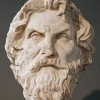Call me a scoundrel, only call me rich!
All ask how great my riches are, but none
Whether my soul is good.[ἔα με κερδαίνοντα κεκλῆσθαι κακόν]
Euripides (485?-406? BC) Greek tragic dramatist
Bellerophon [Βελλεροφῶν], frag. 181 (Nauck, TGF) (c. 430 BC) [tr. Gummere (1925)]
(Source)
Barnes frag. 65. Found (in Latin) in Seneca, Epistulae morales ad Lucilium, 115.14:
Sine me vocari pessimum, ut dives vocer.
An dives, omnes quaerimus, nemo, an bonus.
(Source (Greek)). Alternate translations:
If any gain ensue, I am content.
To be term'd wicked. We all ask this question,
Whether a man be rich, not whether virtuous.
[tr. Wodhull (1809)]
Let me be called a scoundrel, but a rich one.
We all ask if he’s rich, not if he’s good.
[Source]
Quotations about:
scoundrel
Note not all quotations have been tagged, so Search may find additional quotes on this topic.
Precisely in trifles, wherein a man is off his guard, does he show his character, and then we are often able at our leisure to observe in small actions or mere mannerisms the boundless egoism which has not the slightest regard for others and in matters of importance does not afterwards deny itself, although it is disguised. We should never miss such an opportunity. If in the petty affairs and circumstances of everyday life, in the things to which the de minimis lex non curat applies, a man acts inconsiderately, seeking merely his own advantage or convenience to the disadvantage of others; if he appropriates that which exists for everybody; then we may be sure that there is no justice in his heart, but that he would be a scoundrel even on a large scale if his hands were not tied by law and authority; we should not trust him across our threshold. Indeed, whoever boldly breaks the laws of his own circle will also break those of the State whenever he can do so without risk.
[Gerade in Kleinigkeiten, als bei welchen der Mensch sich nicht zusammennimmt, zeigt er seinen Charakter, und da kann man oft, an geringfügigen Handlungen, an bloßen Manieren, den gränzenlosen, nicht die mindeste Rücksicht auf Andere kennenden Egoismus bequem beobachten, der sich nachher im Großen nicht verleugnet, wiewohl verlarvt. Und man versäume solche Gelegenheit nicht. Wenn Einer in dem kleinen täglichen Vorgängen und Verhältnissen des Lebens, in den Dingen, von welchen das de minimis lex non curat gilt, rücksichtslos verfährt, bloß seinen Vertheil oder seine Bequemlichkeit, zum Nachtheil Andere, sucht; wenn er sich angeignet was für Alle da ist u. s. w.; da sei man überzeugt, daß in seinem Herzen keine Gerechtigkeit wohnt, sondern er auch im Großen ein Schuft sein wird, sobald das Gesetz und die Gewalt ihm nicht die Hände binden, und traue ihm nicht über die Schwelle. Ja, wer ohne Scheu die Gesetze seines Klubs bricht, wird auch die des Staates brechen, sobald er es ohne Gefahr kann.]
Arthur Schopenhauer (1788-1860) German philosopher
Parerga and Paralipomena, Vol. 1, “Aphorisms on the Wisdom of Life [Aphorismen zur Lebensweisheit],” ch. 4 “Counsels and Maxims [Paränesen und Maximen],” § 3.29 (1851) [tr. Payne (1974)]
(Source)
The Latin means, "The law is not concerned with trifles." (Source (German)) Alternate translations:
A man shows his character just in the way in which he deals with trifles, -- for then he is off his guard. This will often afford a good opportunity of observing the boundless egoism of man's nature, and his total lack of consideration for others; and if these defects show themselves in small things, or merely in his general demeanor, you will find that they also underlie his action in matters of importance, although he may disguise the fact. This is an opportunity which should not be missed. If in the little affairs of every day, -- the trifles of life, those matters to which the rule de minimis non applies, -- a man is inconsiderate and seeks only what is advantageous or convenient to himself, to the prejudice of others' rights; if he appropriates to himself that which belongs to all alike, you may be sure there is no justice in his heart, and that he would be a scoundrel on a wholesale scale, only that law and compulsion bind his hands. Do not trust him beyond your door. He who is not afraid to break the laws of his own private circle, will break those of the State when he can do so with impunity.
[tr. Saunders (1890)]
Men best show their character in trifles, where they are not on their guard. It is in insignificant matters, and in the simplest habits, that we often see the boundless egotism which pays no regard to the feeling of others, and denies nothing to itself.
[In Tryon Edwards, A Dictionary of Thoughts, "Character" (1891); this is the version quoted most often.]
Continuous association with base men increases a disposition to crime.
[Φαύλων ὁμιλίη συνεχὴς ἕξιν κακίης συναύξει.]
Democritus (c. 460 BC - c. 370 BC) Greek philosopher
Frag. 184 (Diels) [tr. Freeman (1948)]
(Source)
Cited in Diels as "184. (194 N.)"; collected in Joannes Stobaeus (Stobaios) Anthologium II, 31, 90.
Alternate translations:
- "Frequent association with the wicked increases a disposition to vice." [tr. Barnes (1987)]
- "Associating with scoundrels frequently increases the possession of wickedness." [tr. @sententiq (2020), Fr. 234]
- "By associating with scoundrels, you will turn out a scoundrel"
- "Continuous association with the wicked increases bad character."
It is strange that we sort the wheat from the chaff and the unfit from the fit in war, but we do not excuse evil men from the service of the state.
[ἄτοπον ἔφη τοῦ μὲν σίτου τὰς αἴρας ἐκλέγειν καὶ ἐν τῷ πολέμῳ τοὺς ἀχρείους, ἐν δὲ πολιτείᾳ τοὺς πονηροὺς μὴ παραιτεῖσθαι]
Antisthenes (c. 445 - c. 365 BC) Greek Cynic philosopher
Fragment 104 [tr. Laurén]
(Source)
In Diogenes Laertius, Lives of the Eminent Philosophers, Book 6, ch. 1.
Alt. trans.:
- "He used to say that it is strange that we sift out the chaff from the wheat and those useless for war, but we do not forbid scoundrels in politics." [@sentantiq (3 Jun 2020)]
- "He used to say that it was strange that we separate the wheat from the chaff, the useless in war, but we do not ban wicked men from public life." [@sentantiq (21 Feb 2017)]
- "That it seemed very absurd to separate the chaff from the wHeat, to discharge a coward from the army, and not to extrude the envious from the state." [Source (1753)]
- "'It is strange,' said he, 'that we weed out the darnel from the corn and the unfit in war, but do not excuse evil men from the service of the state.'" [Loeb Classical (1925)]
The heart never grows better by age; I fear rather worse; always harder. A young liar will be an old one; and a young knave will only be a greater knave as he grows older.
Lord Chesterfield (1694-1773) English statesman, wit [Philip Dormer Stanhope]
Letter to his son, #225 (17 May 1750)
(Source)
We are more apt to persecute the unfortunates than the scoundrels; the scoundrels may retaliate.
Paul Eldridge (1888-1982) American educator, novelist, poet
Maxims for a Modern Man, #952 (1965)
(Source)








